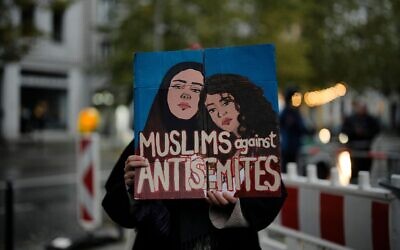In the aftermath of 7 October, when many Jewish and Muslim relationships fractured, two Manchester faith leaders – Rabbi Dovid Lewis and Imam Nasser Kurdy – have chosen a different path: deeper friendship and dialogue. The commitment now takes centre stage in their new podcast, The Rabbi, The Imam and The Power of Dialogue, launched last week to model how people of faith can have difficult conversations without falling apart.
Imam Kurdy says the podcast was born of something deeper than interfaith theory – it was forged in personal trust. “I think our ability to dig deep, to trust the other person that if you dig, they will dig with you… We started to see into each other, that honesty, that person. And it was not something that was threatening or uncomfortable. We’ve reached that stage where we were so honest with each other.”
The pair first met over a decade ago at a community dialogue group in South Manchester. Their friendship deepened after Kurdy, a surgeon and Iay Imam originally from Jordan, survived a stabbing outside his mosque in 2017. Rabbi Lewis, leader of South Manchester’s Jewish community, was one of the first to reach out.
“We said, ‘How can we work together?’” recalls Lewis. “We did. When we did the shul and the mosque, we worked on a number of different events – cooking food for the local homeless shelter, lift-up projects.
But the most important aspect of our project is that you can’t make friends during a crisis. You have to develop those friendships beforehand, in advance, under easier times of peace.
That long-standing trust proved vital after the Hamas attacks and the war in Gaza, which Kurdy says “hit all of us” and forced both communities to “dig deep”. The pair say it was their friendship – already forged years earlier through shared projects and their support for one another after Kurdy was stabbed in 2017 – that made honest conversation possible. “He wasn’t just a local Imam that was stabbed,” says Lewis. “He was a friend.”
Their podcast, co-produced by Mark Schweiger and Philip Berman of Larchmont Productions grew from an earlier initiative – a series of joint school visits across Greater Manchester. “One of the things I sat with was, how can we get to the student, from a grassroots level, and show them that a Jew and a Muslim can stand side by side and coexist?” Schweiger said. “Today, we’ve probably been in front of 9,000 students.”
The school sessions – including stops at academies run by Manchester United, Manchester City, Everton and Liverpool – focus on modelling respectful disagreement. Lewis and Kurdy don’t aim to agree – they aim to understand. “It’s not about getting them to agree,” says Lewis. “It’s about: Okay, we understand each other. We know the other person’s pain. And we will do it in a way that doesn’t feel like treason to our own.”
Rabbi Dovid Lewis and Imam Nasser Kurdy lead a school session on dialogue and empathy. Photo Credit: Manchester Grammar School
They stress the principle of “face-to-face” dialogue, not side-by-side performative tolerance. “We’re not just giving you a faith view. We’re giving you a conversation,” Lewis says. “Two people who, on paper, should not get on – but who challenge each other as equals.”
This has made a real impression on students. One moment stands out: a young Syrian refugee rose in tears to ask a question. “I looked at his face and the pain,” said Lewis. “He doesn’t want my answer. All he wants is empathy. I just said, ‘I’m sorry. I feel for you. Let’s speak about that.’”
Imam Kurdy shares a similar philosophy. “We actually stress the basis on which we are standing. Equality in humanity. Equality in empathy. Equality in respect.
We don’t take a point and argue it – we give the background to how a position can be reached when you don’t agree.
The podcast builds on that approach. Future episodes will explore faith, disagreement, youth leadership and online conflict. “If one teenager doesn’t react to that nasty post on Instagram or X, if they change their mindset… then the algorithm of the heart changes,” says Lewis. “That’s our real mission.”
While the podcast and school visits have been warmly received, the team acknowledge that a few individuals in both communities have sometimes questioned whether interfaith efforts are worth the effort. “It’s not criticism,” says Kurdy. “But you do occasionally hear it.” Lewis agrees: “Some people just say, ‘Why bother?’ There’s a sense of despair. But we’re doing this precisely because it’s hard — and because it matters.”
One school, Lewis adds, even cancelled its Holocaust memorial plans, citing “political sensitivities” – but told the parents not to worry because “the rabbi and the Imam are coming next month.” He shook his head at the logic: “Those two days are interrelated. But this shows the podcast is seen as a resource.”

A vigil to show Muslim support for the Jewish community in the wake of 7/10
For Kurdy, the goal is simple: “Relationships need to be rekindled. Wonderful Jewish-Muslim relationships have just withered away. We want to bring them back together.”
Or as Rabbi Lewis puts it: “We’re here. We’re here to stay. And we need to speak. Not agree – speak.”
Listen to episode one of The Rabbi, The Imam and The Power of Dialogue here.